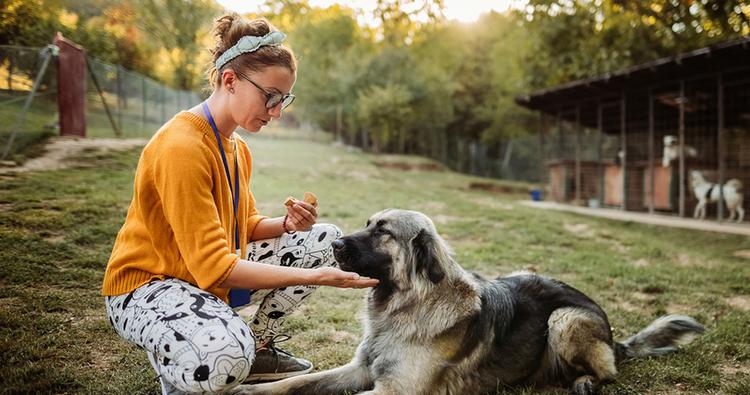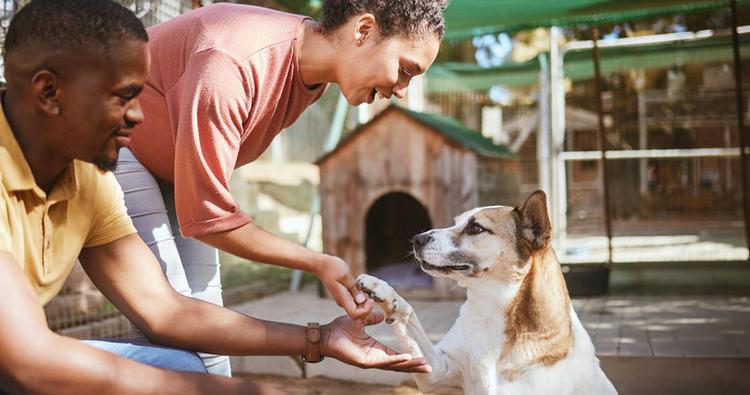Pet Adoption Checklist: 10 Things to Consider Before Adopting a Pet
It’s a big decision, so check these boxes before you sign on the dotted line.
It’s a big decision, so check these boxes before you sign on the dotted line.
by Jodi Helmer, | June 12, 2023

Leah Flores / Stocksy
So this is it: you’re ready to adopt. Or are you? Adopting a pet is a long-term commitment; you’ll be responsible for another life, and you have to be ready to take on whatever that entails. Before filling out that adoption paperwork, be sure you’ve thought through all the variables. Here are ten things to consider before adopting a pet.

A shelter visit can feel just as stressful as a job interview (with a little more drool involved.) So we have a guide to help your prep.
Pet parenthood will inevitably alter your life, and you’re probably wondering how to prepare for a dog, cat, or other pet to change your lifestyle. Here are some changes you can expect:
Routine: Instead of hitting the snooze button (again), you’ll need to hop out of bed and walk the dog, dish out breakfast, and/or scoop out the litter box — and then head straight home from work to serve dinner, manage potty breaks, and offer snuggles to dogs and cats who have spent the last eight hours waiting for you.
Budget: You’ll need to spend money on food, vet care, grooming, and other costs associated with having a pet.
Lifestyle: If you rent, you’ll need to make sure your landlord allows pets — and will have to ensure that’s the case for any future rentals throughout your pet’s life as well.
“This is a big decision and a 16-plus-year commitment,” says Julie Sinaw, president and founder of Animal Lighthouse Rescue in New York City. “Make sure you’re ready for that commitment. Adopting a pet is a lot of work, as well as a large financial and time commitment. If you are ready for a commitment, there is no greater love than that of a cat or dog.”
You can use Adopt a Pet’s Find a Pet search tool to see adoptable pets near you. You can also check your local shelter or rescue organizations’ websites.
Many types of pets are available for adoption. While the most commonly adopted pets are cats and dogs, a number of shelters often have other pets available.
There are also many rescue organizations that specialize in rehabilitating and adopting out other animals, such as farm animals and exotic pets.
There are so many benefits of adopting a pet from a shelter or rescue organization, but the first and foremost is that adopting saves lives. There are already so many pets out there in need of homes and who may be euthanized — or otherwise kept in less-than-ideal conditions in rescue for far too long — and by adopting them, you’re giving them a chance at a happy life. Adoption fees are also generally far less than the fees breeders charge, so adoption is more affordable. There are even sustainability reasons to adopt from a shelter. The list goes on.
Knowing what to expect before adopting a pet can help make the transition to pet parenthood as smooth as possible. Here are ten things you need to consider before you bring a dog, cat, or other pet into your home.
If you’re renting, you’ll want to get permission from your landlord to bring a pet into your home in advance. It’s also important to note that even pet-friendly rentals may have species, weight, or even breed restrictions. Also, consider the length of your lease and if you plan on sticking around for a while; if you move, you’ll need to ensure your next home accepts your pet, too.
“Different pets require different amounts of time and effort, but all pets need regular care and company,” says Holly Sizemore, Chief Mission Officer for Best Friends Animal Society.
If you want every member of the household to participate in pet care, Ruth Allen, director of admissions and matchmaking at the American Society for the Prevention of Cruelty to Animals (ASPCA) Adoption Center, adds, "It’s a good idea to draw up a schedule of who in the family will help with the care of your new pet, including playing, feeding, grooming and walking."
Your four-legged friend sleeps on the bed, watches your favorite shows, and keeps you company while you cook dinner — so don’t be surprised if they’re all up in your business while you’re doing your business. Go ahead and close the door, but they might scratch and whine. Or invite them to curl up at your feet. Who needs privacy, anyway?
You’ll need to budget for food, vet care, grooming, boarding, pet sitters, and other costs associated with having a pet. Adopting from a shelter, however, can help keep costs in check, according to Sizemore.
“Pets for adoption from shelters and rescue groups are usually already spayed or neutered, vaccinated and microchipped — services that can cost hundreds of dollars,” she adds. “When you adopt a pet, you not only save a life; you save a lot of money.”
Getting pet insurance or establishing a savings account will help with unexpected costs, but “it’s vital to consider the upfront costs when thinking about adding a new pet to your household, as well as the long-term financial obligations,” Allen says.
While it can be tempting to adopt a pet because you feel it’s love at first sight, take a few days to consider. You need to make a real commitment to care for your pet for their entire life — which can be up to 20 years or more. Take the time to prepare your home, plan, get your finances in order, and make sure that you are fully prepared to commit to your pet.
Ask any pet parent: Poop happens. Vomit, too. Whether you’re scooping a litter box, picking up on a walk, or (oops) cleaning up an accident, it’s important to feel comfortable with all the bodily fluids your adorable companion produces. “Most people can get into a routine to clean up pet hair and all the other things that come out of dogs and cats and focus on all the wonderful benefits of having pets,” Sizemore says. “It makes the cleanup worthwhile.”
Keep the lint roller handy. Your favorite sweater and the shirt you plan to wear to work will inevitably be covered in hair — even if you have a non-shedding dog. Do a quick once over with a lint roller or wear a T-shirt that declares “dog hair is glitter” and embrace it.
Puppies and kittens get a lot of attention at shelters, but don’t overlook older animals. Sizemore notes that senior pets are as loving and loyal as their younger counterparts and are often easier to care for because they’ve outgrown puppy-like behaviors such as teething or potty accidents.
“A great benefit to adopting an adult pet is that you know exactly what you’re getting,” says Allen. “Their size, weight, and personality are already developed, so you can choose them for what they are rather than for what you hope they’ll be when they grow up. When it comes to choosing the right animal to adopt, prospective adopters should keep an open mind [and] ask questions.”
You might be your dog’s BFF, but he needs other friends, too. “Dogs need training and socialization to learn how to be healthy and happy members of the family, and that responsibility falls to you,” Sizemore says. Look for options like group obedience classes, take dogs on outings to the park or dog-friendly shops and restaurants, and introduce them to new people (and other dogs) to ensure your dog is calm and well-adjusted.
Before adopting a pet, make any necessary modifications to your home, yard, and fence (if you have one) to provide for your pet’s safety. Securing furniture, locking away cleaning supplies, fixing screens and doors — there is plenty to do to pet-proof your home.
Once you’re ready to adopt use the Find a Pet search to see adoptable pets near you. If you don’t see your perfect match, sign up for Pet Alerts so new matching kitties will be emailed to you daily.
You should adopt a pet instead of buying one because many pets need homes and may be euthanized or kept in rescue for far too long. Adopting a pet gives them a chance at a happy life or could even save their life.
A pet’s cost over their lifetime and the way having a pet will change your schedule and how you spend your time are essential factors to consider before adoption.
You can use Adopt a Pet’s Find a Pet search tool to see adoptable pets near you.
While cats and dogs are the most commonly adopted pets, some shelters often have other pets, such as rabbits, guinea pigs, and birds, available for adoption.
Adopting a pet from a shelter or rescue organization doesn’t just save the life of the pet you rescue, but makes space for them to save another life.
Think through all the variables involved with the transition to pet parenthood and make sure you’re equipped to care for a pet for the rest of their life.

Jodi Helmer is a North Carolina-based freelance writer who shares her home with an embarrassing number of rescue dogs and relies on four feral cats to patrol the barn. When she isn’t refilling food and water dishes, Jodi writes about animals for Scientific American, Sierra, WebMD, AKC Family Dog, Living the Country Life, and Out Here.

Shelters & Rescue

Shelters & Rescue

Adoption Advice

Shelters & Rescue
Not every cat will be a match for you (and vice versa). Here’s how to find “the one.”

Adoption Advice
Adopting a new dog? Check out these 10 for preparing yourself and your home to welcome your new family member and help your dog settle in.

Adoption Advice
Considering adopting a cat? This comprehensive guide covers all the practical advice that will help you make an informed decision.

Adoption Advice
Getting a dog can be the best thing you ever do — if you’re prepared. Here’s a checklist any prospective pet parent should consider before adopting a new bestie.

Adoption Advice
Adopting a new puppy? We've created a checklist to help you get organized before bringing your new friend home.

Shelters & Rescue
Looking to adopt? Here are some helpful guidelines on finding a reputable pet rescue organization.


Shelters & Rescue
Shelters always need a variety of volunteers — and you offer more helpful skills than you realize.

Adoption Advice
Considering dog adoption? Learn the differences between adult dog and puppy adoption to find your perfect match.